|
|
|
Sort Order |
|
|
|
Items / Page
|
|
|
|
|
|
|
| Srl | Item |
| 1 |
ID:
087552
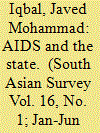

|
|
|
|
|
| Publication |
2009.
|
| Summary/Abstract |
The acquired immunodeficiency syndrome (AIDS) epidemic is now considered not only a health problem, but also a development issue as well as a security threat. While states have responded in varied ways to the AIDS epidemic, most have failed in combating it. What explains the variations in state responses to the AIDS epidemic? This article compares the state responses of Brazil, India and South Africa to AIDS with the help of a few variables: states' primacy to human security, socio-cultural norms, civil society activism and a rapidly changing strategic environment. This article demonstrates that a greater level of state's primacy to human security threats like HIV/AIDS and civil society activism produce a more successful state response. The article further suggests that social and political conditions do impact upon the state's response to AIDS. Prominent among them are the rapidly changing strategic environment and socio-cultural norms
|
|
|
|
|
|
|
|
|
|
|
|
|
|
|
|
| 2 |
ID:
091867
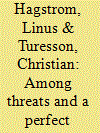

|
|
|
|
|
| Publication |
2009.
|
| Summary/Abstract |
This article is written against the backdrop of widely discussed changes in Japanese foreign security policy in the 2000s-changes often attributed to an intensifying North Korea threat and growing rivalry with China. Employing Walt's notion of "threat" (in effect, offensive power plus aggressive intentions), the thesis of this article is that China and North Korea could be construed as increasingly threatening to Japan. The antithesis is that changes in Japanese foreign security policy have rather taken place within the context of a public discourse that has increasingly framed China and North Korea as "threats." The article demonstrates that, while Chinese military capability has burgeoned in the past decade, North Korea has experienced something like military stagnation. Moreover, although both actors have histories of foreign aggression, their respective official discourses lack aggressive intentions vis-a-vis Japan. The article also demonstrates that while Japanese government sources have kept framing North Korea as a threat or a grave security concern, China has merely been depicted as "in need of further attention." To understand these ambivalent results, the article introduces the synthesizing idea that a North Korean "threat" might serve as a "perfect excuse" for changing Japanese foreign security policy in the face of what could obviously be construed as a more pressing China threat.
|
|
|
|
|
|
|
|
|
|
|
|
|
|
|
|
| 3 |
ID:
073630


|
|
|
| 4 |
ID:
121221
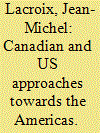

|
|
|
|
|
| Publication |
2012.
|
| Summary/Abstract |
The purpose of this article1
is to envisage the evolution of the relations
between Canada and the United States with their southern neighbours,
with the objective of comparing the respective attitudes of the two North
American partners vis-à-vis Latin America. Under the administration
of George W. Bush, anti-Americanism intensi?ed worldwide. Nothing
comparable occurred in the case of Canada: as a middle power with a legacy
of peacekeeping initiatives in its recent past, it naturally came to be perceived
in a more positive way. This difference led many to wonder whether Canada
might be contemplated, in the Americas as elsewhere, as representing
somehow a "more acceptable" version of the US. Or at least it did so until
the past few years, during which time it has been said that the elections of
Stephen Harper in 2006 and of Barack Obama in 2008 have brought about
a shift in the two countries' "images." This article seeks to test this claim,
with special reference to the relations of each with Latin America.
|
|
|
|
|
|
|
|
|
|
|
|
|
|
|
|
| 5 |
ID:
086578
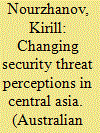

|
|
|
|
|
| Publication |
2009.
|
| Summary/Abstract |
This article discusses the current process of securitisation in Central Asia and identifies its convoluted and faulty nature as a factor impeding collective security action in the region. It uses the Regional Security Complex Theory (RSCT) as an explanatory tool and posits that security discourse in - and about - the five former Soviet republics is dominated by geopolitical grand strategy on the one hand and by particularist concerns about lack of democracy or transnational threats on the other. Issues of conventional security involving two or more states, such as territorial disputes or resource management, are pushed aside and rarely securitised at the official level. The article outlines conceptual and institutional reasons for this bias, and argues that unless inter-state tensions are properly analysed, debated and addressed, the prospects for security and stability in the region will remain grim.
|
|
|
|
|
|
|
|
|
|
|
|
|
|
|
|
| 6 |
ID:
075494
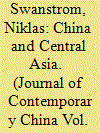

|
|
|
|
|
| Publication |
2005.
|
| Summary/Abstract |
Central Asia and China have been closely intertwined in history and today that relationship has begun to re-emerge. This article analyses the reasons for the close cooperation which has re-emerged in the 1990s and boomed in the twenty-first century. Domestic and internal factors, as well as political and economic considerations are included in the search for an explanation for current relations and future expectations. Despite the fact that China has emerged as one of the world's most powerful states, its dependence on the Central Asian states in regard to oil and gas but also domestic security is intriguing. The future of Sino-Central Asian relations is deeply embedded in joint problems and common interests, but also in fear of domination and external intervention.
|
|
|
|
|
|
|
|
|
|
|
|
|
|
|
|
| 7 |
ID:
121939
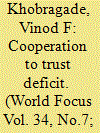

|
|
|
|
|
| Publication |
2013.
|
| Summary/Abstract |
India's relations with its neighbours are full of stress and confrontations as it is presumed that India's every neighbouring state seem ready to pose security threat to India. Therefore, India always remained restless in the region to protect its security interests. Moreover, India's posture in South Asia has always supposed to be disturbing among the states in the region. However, India's relations with Sri Lanka have been cordial than any other state in South Asia.
|
|
|
|
|
|
|
|
|
|
|
|
|
|
|
|
| 8 |
ID:
181884
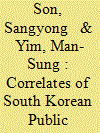

|
|
|
|
|
| Summary/Abstract |
What explains South Korean public opinion on nuclear weapons development? Despite the US security commitment, most South Koreans consistently support independent nuclear weapons development. To solve this puzzle, we investigate the mechanisms of security threat and security commitment under which individuals develop their opinion on nuclear proliferation. An original survey of 1,988 South Korean adults shows empirically supported correlates of South Korean public opinion on nuclear proliferation. Public support for proliferation is largely shaped by external security threats: nuclear threats from North Korea and China, but also the latent nuclear superiority of Japan. Public opposition to proliferation is fostered by the perceived credibility of the US security commitment, but not by its perceived effectiveness. The results provide insights into South Korean public opinion on nuclear proliferation and can inform the design of a nonproliferation policy tailored to South Korea.
|
|
|
|
|
|
|
|
|
|
|
|
|
|
|
|
| 9 |
ID:
129429
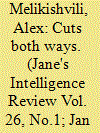

|
|
|
| 10 |
ID:
154653
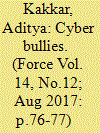

|
|
|
| 11 |
ID:
131289


|
|
|
|
|
| Publication |
New Delhi, Oxford University Press, 2014.
|
| Description |
viii, 306p.Pbk
|
| Standard Number |
9780199451654
|
|
|
|
|
|
|
|
|
|
|
|
Copies: C:1/I:1,R:0,Q:0
Circulation
| Accession# | Call# | Current Location | Status | Policy | Location | IssuedTo | DueOn |
| 057761 | 005.8/SIN 057761 | Main | Issued | General | | RA73 | 12-Apr-2024 |
|
|
|
|
| 12 |
ID:
181665


|
|
|
|
|
| Summary/Abstract |
A common explanation for the increasing polarization in contemporary American foreign policy is the absence of external threat. I identify two mechanisms through which threats could reduce polarization: by revealing information about an adversary that elicits a bipartisan response from policymakers (information mechanism) and by heightening the salience of national relative to partisan identity (identity mechanism). To evaluate the information mechanism, study 1 uses computational text analysis of congressional speeches to explore whether security threats reduce partisanship in attitudes toward foreign adversaries. To evaluate the identity mechanism, study 2 uses public opinion polls to assess whether threats reduce affective polarization among the public. Study 3 tests both mechanisms in a survey experiment that heightens a security threat from China. I find that the external threat hypothesis has limited ability to explain either polarization in US foreign policy or affective polarization among the American public. Instead, responses to external threats reflect the domestic political environment in which they are introduced. The findings cast doubt on predictions that new foreign threats will inherently create partisan unity.
|
|
|
|
|
|
|
|
|
|
|
|
|
|
|
|
| 13 |
ID:
108873
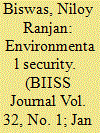

|
|
|
|
|
| Publication |
2011.
|
| Summary/Abstract |
The evolving concepts of environmental security are debated in the discourse of security studies. Major theoretical paradigms of international relations have been quite successful to interpret the practical security problems arising from environmental and climatic changes. Academics and practitioners have started exploring the security implications of the changes at various levels. This paper explores how environmental degradation poses significant challenges to security. It reviews both traditional and nontraditional schools of thought of security studies. The paper examines the conceptual linkages between environment and security, focusing on the contributions of the constructivist school of thought in the construction of the idea of environmental security. It also examines the contribution of other schools, and acknowledges the importance of environment-threat-vulnerability framework that establishes the relationship between environmental degradation and potential conflicts. It works with a small set of empirical information to explain the prevalence and effects of ecological degradation and climate change, and national and international policy responses to address the threats. This paper concludes that environment is a significant threat to security.
|
|
|
|
|
|
|
|
|
|
|
|
|
|
|
|
| 14 |
ID:
144956
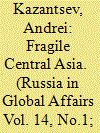

|
|
|
|
|
| Summary/Abstract |
Today post-Soviet Central Asian countries are facing problems caused by old security challenges and the emergence of completely new threats. These threats may hamper the future of secular statehoods in the region and present a serious obstacle to modernization.
|
|
|
|
|
|
|
|
|
|
|
|
|
|
|
|
| 15 |
ID:
166205
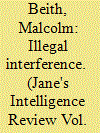

|
|
|
| 16 |
ID:
086174
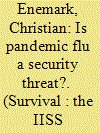

|
|
|
|
|
| Publication |
2009.
|
| Summary/Abstract |
Most infectious diseases do not attract heightened political attention because their effects are mild, they are familiar to physicians, or their geographic occurrence is limited. A particular disease might be deemed a security issue, however, when its effects impose or threaten to impose an intolerable burden on society. That burden can be measured in terms of morbidity and mortality, but also in terms of the way in which a disease is perceived by those who fear infection. The disease described by the World Health Organisation (WHO) as 'the most feared security threat' today is pandemic influenza.The next pandemic could cause illness and death on a large scale, over a wide area, in a short space of time. Such a prospect arguably sets this disease apart from the many others that may be regarded simply as health issues, and some Western governments have started to frame pandemic influenza as a threat to national security. According to the US pandemic plan, a 'necessary enabler of pandemic preparedness' is that this be viewed 'as a national security issue'. The 'National Security Strategy of the United Kingdom' assesses an influenza pandemic as the 'highest risk' civil emergency. And under the Australian pandemic plan, which emphasises 'maintenance of social functioning', Australians are to receive the best possible health care 'commensurate with the maintenance of a safe and secure society'.
|
|
|
|
|
|
|
|
|
|
|
|
|
|
|
|
| 17 |
ID:
073244


|
|
|
| 18 |
ID:
126308


|
|
|
|
|
| Publication |
2013.
|
| Summary/Abstract |
Before being able to establish whether certain kinds of organised cyber-crime constitute a security threat, it is important to consider the wide variation in structure and targets of cyber-criminal organisations, some of which are state agencies or state-sponsored organisations, or involve collaboration between states and private entities. Peter Grabosky argues that some forms of organised cyber-crime may be a nuisance but they cannot be regarded as threats to national or international security, while cyber-crimes do impact on national security and can lead to international conflict. In either case, traditional definitions of organised crime do not accurately reflect the nature or organised cyber-crime.
|
|
|
|
|
|
|
|
|
|
|
|
|
|
|
|
| 19 |
ID:
126287
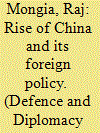

|
|
|
|
|
| Publication |
2013.
|
| Summary/Abstract |
The vast majority of Indians is worried about China`s rise and considers it a security threat, an opinion poll has revealed, with the result exposing a serious trust deficit between the Asian giants. The surveys, conducted by the Lowy Institute for international policy and the Australia Indian Institute, Found that 83 per cent of Indians considered China a security Threat. A possible war with China was rated a "big Threat" by almost three in four respondents. Reasons included China`s possession of nuclear weapon, competition for resources, and border disputes. Even through China is now India`s largest trading partner, just 31 per cent of Indians agreed that China`s rise had been good for India.
|
|
|
|
|
|
|
|
|
|
|
|
|
|
|
|
| 20 |
ID:
106740
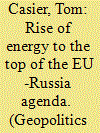

|
|
|
|
|
| Publication |
2011.
|
| Summary/Abstract |
Over the last decade we have witnessed an increasing politicisation of the energy discourse. Today energy relations of the EU are framed in terms of excessive dependence on Russia, qualifying the latter as a security threat. This article puts forward four criteria to define energy relations in security terms: supply vulnerability of the EU, the absence of Russian demand dependence, the dominance of energy over other capabilities, the willingness to link energy to foreign policy objectives. Little support is found to define the dependence on the import of Russian energy resources as a security issue. An alternative explanation is given, attributing growing energy concerns to shifting identities and perceptions in EU-Russia relations, which have contributed to understanding energy relations in competitive and geopolitical terms. Russia has developed a more assertive energy diplomacy, while in the EU sensitivity over energy dependence has grown as a result of changes on the global energy market and of the 2004 enlargement.
|
|
|
|
|
|
|
|
|
|
|
|
|
|
|
|
|
|
|
|
|